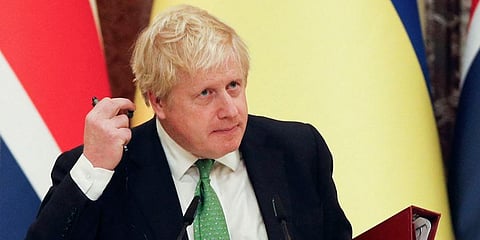

LONDON: British Prime Minister Boris Johnson declared a 'moment of pride' on Monday as he updated the UK Cabinet on his 'living with COVID' plan, which would mark the end of all legal restrictions associated with the pandemic.
Johnson admitted that while the pandemic is not over, vaccines have made it possible for the country to start moving towards normality.
He is expected to update Parliament on the details of the next steps related to current mandatory self-isolation norms following a positive COVID-19 test and mass coronavirus testing before addressing one of his final COVID-19 news conferences from Downing Street to inform the public of the changes.
"Today will mark a moment of pride after one of the most difficult periods in our country's history as we begin to learn to live with COVID," Johnson said, ahead of the announcements on Monday.
"It would not be possible without the efforts of so many the NHS who delivered the life-saving vaccine rollout at phenomenal speed, our world-leading scientists and experts, and the general public for their commitment to protecting themselves and their loved ones," he said.
"The pandemic is not over but thanks to the incredible vaccine rollout we are now one step closer towards a return to normality and finally giving people back their freedoms while continuing to protect ourselves and others," he added.
Downing Street had confirmed over the weekend that the legal restrictions associated with the COVID-19 pandemic are expected to end within days.
Since the country's COVID-19 law was enacted in March 2020 with a strict 'stay at home' lockdown to help the country's health service cope with the crisis, changing levels of restrictions on daily life have been in place across all parts of the UK.
The curbs have included the "rule of six" for indoor gatherings, regional tier systems, as well as so-called "Plan B" measures after the fast-spreading Omicron variant emerged last year.
The legal requirement to wear masks in indoor settings was brought in with Plan B but since then the measures have been considerably relaxed.
The restrictions have varied across the devolved nations of Scotland, Wales and Northern Ireland, but overall England's rules have largely coincided with other regions over the course of the past two years.
The government now wants to move away from "intervention towards personal responsibility" as it plans a vaccine-led approach and says living with the virus will depend on the "sustained population immunity provided by vaccines".
The country's National Health Service (NHS) focus is expected to remain geared towards vaccination to protect the most vulnerable groups from the coronavirus, which is expected to move to an endemic stage similar to flu viruses.
"There comes a time when the pandemic moves to a more endemic approach to COVID-19, in the same way flu and other viruses are treated," said UK Business Minister Paul Scully.
"That's what we've got to get back to, but it's a fine balance clearly," he said.
The legal requirement to self-isolate for a fixed period after testing positive in England has been in place ever since mass testing was rolled out in 2020.
Before that, most testing was limited to people as they arrived in hospital with symptoms.
It remains to be confirmed if the changes will mean people could go to work after testing positive for COVID-19, with Johnson's official spokesperson indicating that would not be what was recommended.
Under the current norms, fully vaccinated individuals who test positive must isolate for up to 10 days, with an option of ending isolation after five days if they register two consecutive negative lateral flow tests on days five and six.
It is also yet to be confirmed if the provision of lateral flow tests, currently available to all for free through an NHS code, will remain in place.
According to official data being collated since the UK's COVID-19 vaccine rollout began in December 2020, around 91 per cent of people in the UK aged 12 and over have had a first dose of a vaccine, 85 per cent a second dose, and 66 per cent a booster or the third dose.